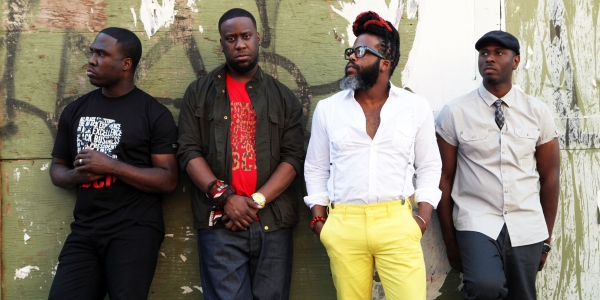Robert Glasper – a trained jazz pianist – grew up in Houston, Texas and regularly performed at Church with his mother. After moving to New York to study music at the New School University in Manhattan, he met and began collaborating with rapper Mos Def. In 2005, he signed to Blue Note Records and released several jazz albums. His first jazz-fusion record Double Booked (2007) was an innovative album split into two distinctive styles. The first half is populated by his post-bop trio, while the latter half introduces his new fusion band, the Robert Glasper Experiment. It was this quartet – Glasper on electronic keyboards, Derrick Hodge on electric bass, Mark Colenburg on acoustic and electric drums and Casey Benjamin on vocoder and sax – that enabled Glasper to pursue an investment in hip-hop that had enticed him since moving to the east coast.
“When I moved to the east coast, I got the chance to befriend and work with a lot of artists, so by the time I signed to Blue Note, one of the guys at the label told me ‘You know, you could do a record with all the people that you know’ and I was like ‘yeah, let’s wait for that.'”
Well, the wait was certainly worth it, allowing Glasper to recruit a number of talented friends he’d made since leaving Texas. Black Radio features collaborations with Erykah Badu, Lupe Fiasco and yasiin bey (Mos Def).
After the unprecedented success of the first Black Radio, Glasper was more than ready to make a volume twp, finding it much easier to get people on board that he wasn’t particularly acquainted with. “A lot of people on part two I didn’t know personally. On the first record I literally knew everyone. It was easier on the second to get people I didn’t necessarily know because we won the Grammy for the first one. They knew who I was. Because otherwise, if you try and call up Snoop Dogg’s people they’d be like ‘What? Jazz?'”
Even though Black Radio 2 – released in October last year – featured a much wider range of vocalists (Jill Scott, Common, Snoop Dogg, Norah Jones, Patrick Stump, Faith Evans), Glasper still has a soft spot for the first volume. “It was the first one of that particular sound and I got to work with my friends. The fact that we even made it to the Grammys and then the album’s inclusion in the Rnb category kicked off this whole Black Radio movement. We were representing a whole community because we weren’t doing what’s popular.”
Keeping the subject on the Grammys and although acknowledging a win as an unquestionable honour, I wanted to ask Glasper if he considered his inclusion in the R&B category as a slap in the face due to Black Radio‘s deliberate swerve away from mainstream urban music. “Not at all,” he answered to my surprise. “You always have to be in some sort of category. There’s no category for artists like me, because there aren’t many artists like me. What a lot of people don’t know about the Grammys is that the artist will always choose what category they want to be nominated in. I chose to be nominated for R&B album of the year, as opposed to jazz album of the year.
“Most of the jazz world didn’t really understand Black Radio. Anyway, a lot of it is not straight up jazz, it has more of an R&B/hip hop sound. If you’re in the R&B category, you’re on a bigger platform, no one knows or cares about the jazz Grammy except the jazz community. I wanted to make this album on a bigger platform with a bigger message.”
With the message being that versatile and alternative black music is both alive and successful, it makes sense that Glasper chose the most accessible category, using it as a means of inspiring the younger generation by showing them a different shade of black music.
I asked Glasper if he’s heard his buddy Q-Tip’s new collaborative mixtape with Busta Rhymes yet. “I haven’t. However people have been texting and tweeting me asking if I’m playing piano on this one song. I’ve worked with Q-Tip for years and I’ve done a lot of stuff at his house studio wise, so I wouldn’t be surprised if he chopped some shit I did up and put it on the record.”
BY DINA AMIN

